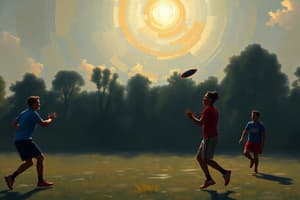Podcast
Questions and Answers
What happens if a player contests a foul during a game?
What happens if a player contests a foul during a game?
- The disc is awarded to the fouled player.
- The foul is disregarded and play continues as normal.
- The disc is returned to the thrower. (correct)
- Both teams have a re-throw from the original thrower.
In Ultimate Frisbee, what occurs when a player commits a Strip Foul?
In Ultimate Frisbee, what occurs when a player commits a Strip Foul?
- The player committing the foul has to apologize to the opponent.
- A goal is awarded to the team of the fouled player. (correct)
- The fouling team gets possession of the disc.
- The fouling player is sent off the field for a set time.
When does a Blocking Foul typically occur in Ultimate Frisbee?
When does a Blocking Foul typically occur in Ultimate Frisbee?
- When a player intentionally blocks an opponent's throw.
- When a player blocks an opponent's line of sight to the disc.
- When a player prevents an opponent from reaching the disc by taking up a position they can't avoid. (correct)
- When a player blocks another player physically from moving on the field.
What happens when there's an uncontested Blocking Foul?
What happens when there's an uncontested Blocking Foul?
How is a Strip Foul different from a Blocking Foul in Ultimate Frisbee?
How is a Strip Foul different from a Blocking Foul in Ultimate Frisbee?
'If the foul is contested, what will happen?' - According to the rules, what is the correct answer?
'If the foul is contested, what will happen?' - According to the rules, what is the correct answer?
After an uncontested Strip Foul that would have otherwise been a goal, what happens next?
After an uncontested Strip Foul that would have otherwise been a goal, what happens next?
What should happen after an uncontested Blocking Foul during an Ultimate Frisbee game?
What should happen after an uncontested Blocking Foul during an Ultimate Frisbee game?
Which action constitutes a Blocking Foul in Ultimate Frisbee?
Which action constitutes a Blocking Foul in Ultimate Frisbee?
How are disputes over fouls typically resolved in Ultimate Frisbee matches?
How are disputes over fouls typically resolved in Ultimate Frisbee matches?
Flashcards are hidden until you start studying
Study Notes
Fouls in Ultimate Frisbee
- A foul can be considered either a receiving foul or an indirect foul, depending on the situation.
Blocking Fouls
- A blocking foul occurs when a player takes a position that an opponent moving legally cannot avoid, resulting in non-minor contact.
- This type of foul is determined by considering the opponent's expected position based on their established speed and direction.
Force-out Fouls
- A force-out foul occurs when a receiver is fouled by a defensive player before establishing possession of the disc.
- The contact causes the receiver to:
- Become out-of-bounds instead of in-bounds.
- Catch the disc in the central zone instead of their attacking end zone.
- If the receiver would have caught the disc in their attacking end zone, it is considered a goal.
- If the force-out foul is contested, the disc is returned to the thrower if the receiver became out-of-bounds; otherwise, the disc stays with the receiver.
Defensive Throwing (Marking) Fouls
- A defensive throwing foul occurs when:
- A defensive player is illegally positioned, and there is non-minor contact between the defensive player and the thrower.
- A defensive player initiates non-minor contact with the thrower, or there is non-minor contact resulting from both vying for the same unoccupied position, prior to the release.
- If a defensive throwing foul occurs prior to the thrower releasing the disc, the thrower may choose to call a contact infraction.
Receiving Fouls
- A receiving foul occurs when a player initiates non-minor contact with an opponent before, while, or directly after, either player makes a play on the disc.
- Contact with an opponent's arms or hands after the disc has been caught or after the opponent can no longer make a play on the disc is not a sufficient basis for a foul, but should be avoided.
- After an accepted receiving foul, the fouled player gains possession at the location of the breach, and play restarts with a check.
Strip Fouls
- A strip foul occurs when an opponent fouls a player, causing them to drop a disc they caught or lose possession of the disc.
- If the reception would have otherwise been a goal, and the foul is accepted, a goal is awarded.
General Fouls
- Any action that disregards the safety of others, creates a significant risk of injury, or is an overly aggressive behavior is considered a foul and will be treated accordingly.
- If the dangerous play is uncontested, it must be treated as the most relevant foul from Section 17.
Studying That Suits You
Use AI to generate personalized quizzes and flashcards to suit your learning preferences.




